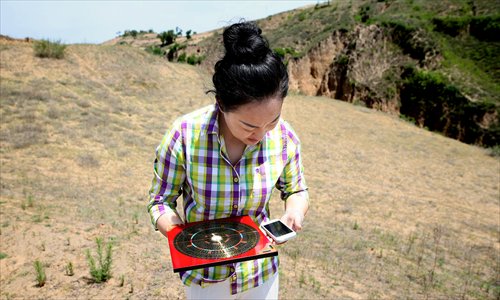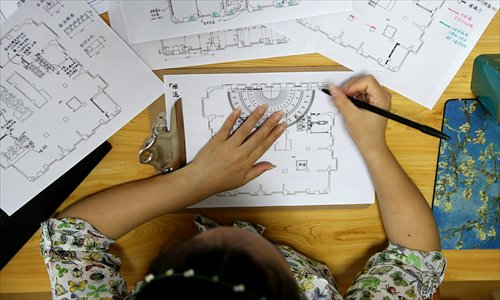HOME >> CHINA
Feng shui foundations
Source:Global Times Published: 2015-8-20 17:23:01

Wang Rong looks down at her compass, trying to determine whether this spot is a good place to build a house. Photo: CFP

When designing a hospital, Wang used many plants. In feng shui, "wood" is conceptually linked to "life," which suits the purpose of the hospital. Photo: CFP

Wang receives her employment certificate from Northwest University in Xi'an, Shaanxi Province. Photo: CFP

Every time she works on a project, Wang needs to go to the site with her compass in order to apply feng shui practices. Photo: CFP

Wang draws the floor plan of a house she's designing. Photo: CFP
Wang Rong got up in the early morning and flew to Yulin, Shaanxi Province with her compass. She climbed deep into the hills, looked down at the compass, then nodded at the people with her. Then they started to draw lines on the ground to represent where the house should go.
Wang is a feng shui consultant. She was on a trip to survey and mark out the foundations of a new villa that will be built in the area.
In 2006, she became the first master's student to study feng shui at Xi'an University of Architecture and Technology in Shaanxi. After graduating in 2009, she's worked in the field of architectural and landscape design using feng shui.
It wasn't easy to find a job at first, Wang said. When she went to interviews, after people found out about her major she would never hear back from them. In 2014, she rented a house and started her own company.
Starting in the 1950s, feng shui became something of a taboo subject in China. For a long time, it was given the negative label of "superstition."
But in modern times, feng shui has taken on a new meaning, said Wang.
In ancient China, feng shui focused mostly on burials. People believed back then that the location of ancestors' graves could influence their children's lives, even bringing them good luck and success if placed correctly.
But feng shui has evolved and now is primarily about developing harmony between humans and nature through architectural design, Wang said. In this way, the ancient practice of feng shui can be applied to modern buildings.
For example, in times gone by, to have good feng shui in your house there should be a mountain or a hill behind the house and the home should have water in front of it, either a pool or a river, and the house should face south, said Zhang Jinqiu, a famous Chinese architect.
These concepts still apply today, because in the Northern hemisphere a south-facing house will get lots of sunlight, and being close to hills, rivers and other beautiful geographical features can make one's living environment more comfortable. He wouldn't call it superstition.
"But I don't believe they can use feng shui to predict people's fate," Zhang said.
Posted in: In-Depth